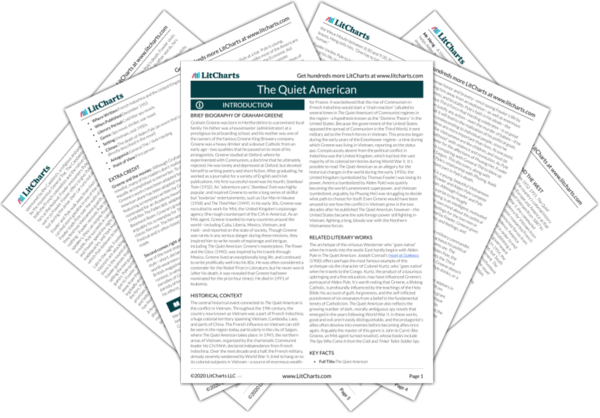Summary
Analysis
In the weeks after Fowler’s discussion with Pyle, he looks for a new apartment, without any success. Eventually, he finds a flat on the other end of the rue Catinat. The neighborhood surrounding his new home is more obviously “colonial” than that of his old flat: there are American and European shoppers everywhere. Fowler thinks that such a sight could provoke Pyle to another bombing.
As the novel approaches an end, Fowler increasingly takes on the role of protecting Vietnamese civilians from the deadly repercussions of Pyle’s misguided ideals. This is surprising, and reiterates that Fowler, while hardly a hero, is more virtuous than he seems.
Themes
One day, Fowler is walking through the area around his apartment, when he sees a group of Europeans who claim to be weary of Vietnamese “demonstrations.” Fowler despises such an attitude, but also finds himself envying the Europeans for their innocence. Just as he’s thinking this, there is a loud explosion, only a few buildings away from where Fowler is standing. A restaurant collapses, shooting broken glass everywhere. Suddenly, Fowler realizes that Phuong must be in the milk bar near the building that has just blown up—it’s her habit to spend afternoons in this place.
Fowler is caught between his two reactions to the Europeans—he despises them for not caring enough about Vietnam, but also wants to identify with them, and to leave Vietnam behind. In a sense, these two sides of Fowler’s relationship with Vietnam parallel the two sides of his relationship with Phuong. Again we see evidence of Fowler’s real love for Phuong, as he is immediately concerned for her safety.
Themes
Fowler runs toward the explosion, pushing past the crowd of onlookers. He tries to make it past the police, but they refuse to let him get any closer to the danger. Fowler reaches for his wallet, which contains a press badge, but finds that his wallet is missing. As Fowler is looking for his wallet, he hears Pyle’s voice—Pyle is trying to move through the crowds as well. Fowler tells Pyle that Phuong is in the milk bar, and may have been injured. Pyle replies that he warned her not to go to the milk bar—she’s safe at home.
Pyle’s warning to Phuong is final, unambiguous proof that Pyle is responsible for the explosions, both today and at the fountain. It’s bizarre that Pyle can “love” Phuong and murder other Vietnamese people as if their lives are completely without value—a contradiction that Fowler will point out.
Themes
Pyle uses his American Legation badge to move past the police, taking Fowler with him. They see dead bodies, including women with their babies. Pyle seems distressed with the sight of blood, and Fowler mocks him, suggesting that he’s never seen it before. Fowler accuses Pyle of planning the bombing, timing it so that it coincided with a parade that had been scheduled for that afternoon. Fowler angrily informs Pyle that the parade had been canceled. In response, Pyle sheepishly admits that he didn’t hear that the parade had been canceled.
Fowler’s attack on Pyle reinforces the flaws in extreme idealism. Pyle is so devoted to his ideas that he doesn’t bother to look at the facts: the individual people who will be murdered because of his actions, or the fact that the object of his attacks won’t even be present that day. Pyle’s sheepish response is curiously childlike: he claims the authority to change Vietnam, and then seems immature when his plans go awry.
Themes
Get the entire The Quiet American LitChart as a printable PDF.

Fowler continues to berate Pyle for his actions. Because Pyle has believed in York Harding and the Third Force, he’s enabled a dangerous thug, General Thé, who clearly has no qualms about killing dozens of Vietnamese innocents. He dares Pyle to admit to Phuong what he’s done. In response, Pyle can only murmur that Thé would never have caused such an explosion—somebody, probably a Communist, must have tricked General Thé. Furious, Fowler leaves Pyle.
Pyle can apparently rationalize anything—even mass murder. To begin with, he can justify killing if it’s for the “greater good”—that is, “The Third Force”: a supposed good that Pyle can’t even explain or define. Furthermore, when his attacks fail to complete their intended purpose, Pyle simply blames the failure on others—like Communists. Fowler finally points out the disconnect between Pyle’s “love” for Phuong and his disregard for other Vietnamese lives.
Themes












